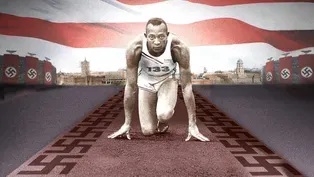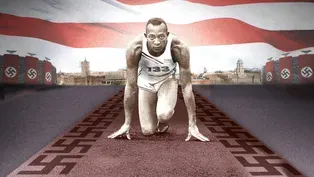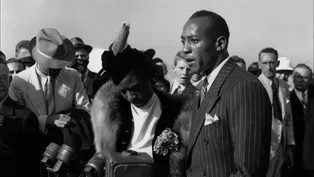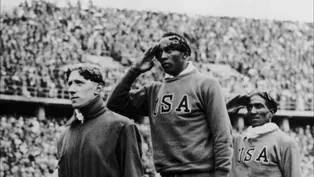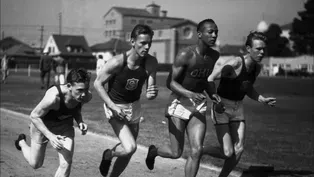

Jesse Owens
Season 24 Episode 7 | 52m 8sVideo has Audio Description, Closed Captions
His stunning triumph at the 1936 Olympics captivated the world and infuriated the Nazis.
The most famous athlete of his time, his stunning triumph at the 1936 Olympic Games captivated the world even as it infuriated the Nazis. Despite the racial slurs he endured, Jesse Owens' grace and athleticism rallied crowds across the globe. But when the four-time Olympic gold medalist returned home, he could not even ride in the front of a bus.
See all videos with Audio DescriptionADProblems with Closed Captions? Closed Captioning Feedback
Problems with Closed Captions? Closed Captioning Feedback
For Season 24 of American Experience, exclusive corporate funding is provided by Liberty Mutual Insurance, major funding by The Alfred P. Sloan Foundation, funding from the Corporation for Public Broadcasting...

Jesse Owens
Season 24 Episode 7 | 52m 8sVideo has Audio Description, Closed Captions
The most famous athlete of his time, his stunning triumph at the 1936 Olympic Games captivated the world even as it infuriated the Nazis. Despite the racial slurs he endured, Jesse Owens' grace and athleticism rallied crowds across the globe. But when the four-time Olympic gold medalist returned home, he could not even ride in the front of a bus.
See all videos with Audio DescriptionADProblems with Closed Captions? Closed Captioning Feedback
How to Watch American Experience
American Experience is available to stream on pbs.org and the free PBS App, available on iPhone, Apple TV, Android TV, Android smartphones, Amazon Fire TV, Amazon Fire Tablet, Roku, Samsung Smart TV, and Vizio.
Buy Now
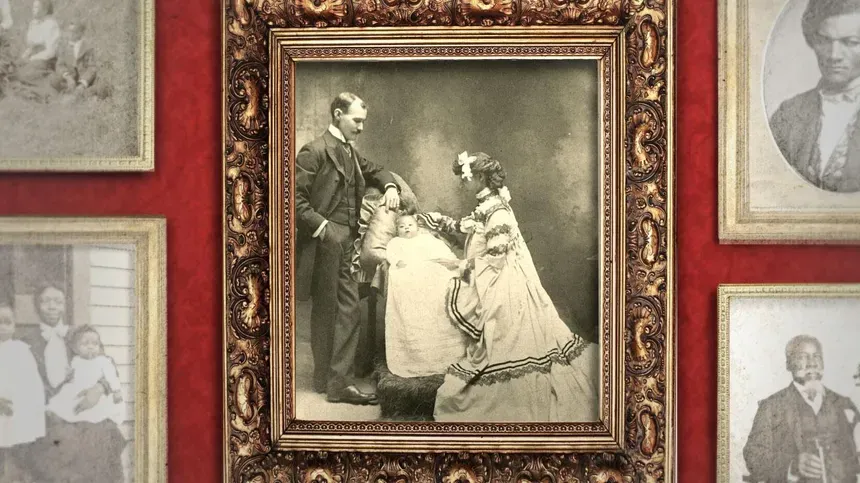
When is a photo an act of resistance?
For families that just decades earlier were torn apart by chattel slavery, being photographed together was proof of their resilience.Providing Support for PBS.org
Learn Moreabout PBS online sponsorship♪ ♪ (starter pistol fires) ♪ ♪ WILLIAM C. RHODEN: Jesse Owens was a model of technical perfection, the way he ran.
Jesse Owens was a machine.
That was in such opposition of what African Americans were supposed to be-- technically proficient.
(Hitler speaking German) MARGARET MacMILLAN: Well, of course, Jesse Owens was not meant to win anything.
The Olympics were to be a sort of symbol of German racial superiority, which to Hitler was so important, and also a symbol of how successful the Nazis were.
HARRY EDWARDS: There were voluminous warnings concerning Nazi philosophy, intentions, the character of Adolf Hitler, and the people that he was surrounding himself with.
Jesse Owens stated that if there are minorities in Germany who are being discriminated against, the United States should withdraw from the 1936 Olympics.
JEREMY SCHAAP: It's the height of the Depression.
And he's a Black man in a country in which he is afforded very few opportunities.
For Jesse Owens, the 1936 Olympics are everything.
Without those Olympics, who knows what's in store for Jesse Owens?
This is his opportunity to become a hero, an enduring hero.
♪ ♪ ♪ ♪ RHODEN: Track and field, on our landscape of sports, was probably the most heroic, it was the purest, it was basically the American ideal.
And there was still something to be said then about who's the fastest person.
There was something about going to the Olympics and being the fastest person in the world.
SCHAAP: In the 1930s, the country was much closer to its frontier roots.
There were so many millions of people who had grown up going to county fairs and state fairs where there were races.
And the simple foot race was something that people could appreciate in a way that later generations don't appreciate.
NARRATOR: As a child, Jesse Owens raced other kids from his Cleveland neighborhood on city sidewalks.
He was the youngest of ten children born to sharecroppers who had migrated north from Alabama.
The world that Jesse grew up in was an accommodationist world.
These are people who have to cooperate with the white power structure to survive.
And it began in Alabama.
They had to be obedient, and they had to be deferential.
And Jesse early on learned to smile to get his way.
And that carried right into his adulthood.
NARRATOR: For young Jesse, running was freedom.
"You could go in any direction, fast or slow as you wanted," he once said, "fighting the wind if you felt like it, "just on the strength of your feet and the courage of your lungs."
♪ ♪ In junior high school, a gym teacher, Charles Riley, noticed his natural talents.
BAKER: Charles Riley became a kind of father figure for Jesse.
So much so that for years, on Sunday afternoons, Charles Riley would go and fetch Jesse in the old Model-T Ford and bring him to his home for dinner.
Jesse, in his adulthood, becomes a very well-mannered, smooth... he's a smooth operator.
And much of that came from the dinner table of Charles Riley.
(bells ringing) ♪ ♪ One of the things Charles Riley told Jesse Owens was, "Never look to your left or right, never look behind you, "that's wasted effort, it's only going to slow you down.
"Look at the horses.
"You don't see them looking left or right or behind them.
They just keep running."
NARRATOR: By the time he was in high school, Jesse had begun to make a name for himself.
He quickly became a star in the 100 and 200 meters, the broad jump, and the hurdles.
GUY WALTERS: Unsurprisingly, Owens was wooed by an enormous number of colleges.
I mean, it was almost like a beauty parade.
But Ohio State were the lucky ones to get him, and that's where he ended up.
♪ ♪ RHODEN: Jesse Owens would be the greatest athlete at a great track school, but there's still race.
Outside of track, there's still certain things that you cannot do because you are a Black person.
MARLENE OWENS RANKIN: They would cover many miles going from one track meet to another, mainly in the Midwest, and there were times when they would have to stop for food, and the Black athletes could not be served in the restaurants.
NARRATOR: As a Black student, Owens wasn't allowed to live on the Ohio State campus.
As he would throughout his life, Owens chose to ignore the racist policy.
For him, the track was a great equalizer.
And there, Owens excelled.
ZAMPERINI: He was just a... really, a graceful piece of a guy.
He was just... nothing bothered him.
Somebody made a racial slur against him, he'd say, "That's his problem, not mine."
So Jesse was great for returning, you might say, good for evil.
NARRATOR: At Ohio State, he was taken under the wing of an innovative coach, Larry Snyder.
SCHAAP: His methods were unorthodox.
One of the things that he was best known for was having his athletes train to the strains of music on the phonograph.
(jazz music playing) He thought it helped them develop rhythm in their strides.
(jazz music continues) ♪ Here's a dance you ought to do ♪ ♪ Let me introduce to you ♪ ♪ Posing, everybody pose ♪ ♪ Get a partner, then begin ♪ ♪ Hold whatever pose you're in ♪ ♪ Posing, everybody pose.
♪ ♪ It's a dance... ♪ NARRATOR: Snyder made sure Owens was elected captain of the track team-- the first Black to lead a sports team in school history-- and pushed him relentlessly to perfect his technique.
REPORTER 1: Jesse Owens, Ohio State marvel, ties the meet records with... REPORTER 2: Jesse Owens of Ohio State set up a new world record for the 220-yard.
REPORTER 3: 100-meter dash, Owens again covers himself with glory as he equals the championship mark of ten and four-tenths... NARRATOR: On the eve of Owens's most important competition so far, the 1935 Big Ten Championship, Owens was horsing around with teammates when he fell down a flight of stairs, injuring his back.
Larry Snyder told him to withdraw.
But Jesse refused.
♪ ♪ JESSE OWENS: As I tried to get down on my mark, I felt this pain, still in my back, and then when he said "set," I came up.
(starter pistol fires) The gun went off.
SCHAAP: One of the remarkable things about Jesse Owens is how injury, pressure, circumstances which might make another man wilt, really steeled his nerves and concentrated all of his talents.
What Jesse Owens achieves at Ferry Field in Ann Arbor is arguably the most spectacular achievement ever in sports.
♪ ♪ He set three brand-new world records in the 220-yard dash, the 220-yard hurdles, and the broad jump.
And, by the way, he's equaled the world record in the 100-yard dash.
All in less than an hour, at a time when most people thought he should be back in bed nursing a sore back.
He becomes the great hope as the Games of the 11th Olympiad approach.
HILMAR DRESSLER (speaking German): ♪ ♪ (woman singing in German) NARRATOR: Five years earlier, the International Olympic Committee had chosen Berlin as host city for the 1936 Olympics.
♪ ♪ Since then, Germany had witnessed the rise to power of the Nazi Party and its leader, Adolf Hitler.
Now Hitler's propaganda minister, Joseph Goebbels, planned to use the Games to the Nazis' advantage.
WALTERS: Initially, Hitler doesn't like the idea of the Olympics.
He rejects it as, I quote, "a Jewish niggerfest."
And that's what he calls it.
It takes Goebbels to make him realize that actually this is a great opportunity for the Germans to show that the "Nordic superman" is actually superior to all these other types of people.
♪ ♪ NARRATOR: Hitler insisted that his Aryan athletes would jump higher, run faster, and prove themselves the best in the world.
He made German domination at the Olympics a national goal.
HITLER (speaking German): MacMILLAN: Black people were not meant to be able to compete with Aryans.
How could they?
For Hitler and the Nazis, this was not the way the very careful script was going to play out.
What their script was was the triumph of the Aryan race, the triumph of Nazi Germany.
THEODOR MICHAEL (speaking German): REPORTER: King of the track!
Ohio State's Jesse Owens makes history in the national collegiate games at Berkeley, California.
This is the 220.
Owens, third from right, already has won the hundred and is out to cop this one, too.
Just a streak of dark lightning as he burns up the track... ♪ ♪ NARRATOR: A year out from the Olympic Games, Jesse Owens went from Midwest college sensation to national celebrity.
He left his girlfriend Ruth Solomon and their young daughter behind, and for the first time in his life, traveled west of the Mississippi.
(camera snapping) ♪ ♪ BAKER: The trip to California was very important for Jesse Owens.
He came into a world that he had never known, and that was an affluent world, it was in some ways a glitzy world, and he was distracted by the new world that he had come in contact with in California.
(flashbulb pops) WALTERS: And he so finds that he's, uh... quite a few female fans are attracted to him, and one of them's called Quincella Nickerson, and she's the daughter of this very wealthy businessman, and I think she represents to Jesse a type of figure, a type of society figure, that he's never encountered before, and he's soon stepping out with her.
NARRATOR: Back in Cleveland, Ruth Solomon got word of Jesse's new social life in California.
SCHAAP: Ruth sends him a threatening letter: "If you're not coming home right now, "and we're not getting married right now, forget about it.
I'm done with you."
♪ ♪ NARRATOR: At the same time, Owens acquired his first real rival on the track, Eulace Peacock of Temple University.
Peacock, a faster starter and even better finisher, began beating Owens in one race after the other.
WALTERS: He starts losing races; he's out of shape.
It doesn't go well.
You know, celebrity and sporting ability, it's a very, very hard mix to get right.
And Jesse, in this instance, just doesn't get it right at all.
NARRATOR: In Nebraska, an astonished crowd watched Peacock tie the world record in the 100 meters, as Owens placed third.
In Ontario, Peacock sailed past Owens again in the 100 meters.
When Owens lost to Peacock in a third matchup, the Associated Press picked Peacock as the favorite to win the Olympic gold in Berlin.
BAKER: If anything, Jesse Owens peaked too soon, and some of his supporters feared that Peacock would conquer Jesse in one or two of the events for the Olympic team.
He's suddenly torn because he is having a good time, um, and he's losing races now which he should not be losing.
NARRATOR: Owens decided to return home.
The same day he arrived in Cleveland, he and Ruth were married.
Jesse settled into a strict training program to prepare for the Olympics.
(crowd clamoring) But far from Ohio, events were unfolding that would soon thrust Owens to the center of a national controversy.
EDWARDS: There were broad-scale discussions in Europe, in the United States, in Canada, about whether or not teams should go to Berlin to participate in those Games.
There were warnings about the absolutely vile and explosive anti-Semitism that was coming out of the Nazi regime, so it's not like this wasn't obvious.
During this period, America and Germany still had cordial diplomatic and economic relations, which the Roosevelt administration did not want to upset.
So the government's position was to take part in the Games.
But a growing movement of Americans, cutting across all religious and racial boundaries, urged U.S. athletes to boycott the Berlin Olympics.
I'm here this evening to join with my fellow New Yorkers in a great protest, not against the German people but against the present German government!
(applause) NARRATOR: Owens had never seen himself as a spokesman.
But as the movement for a boycott grew, the NAACP convinced Owens to take a public stand.
EDWARDS: Jesse Owens stated that if there are minorities in Germany who are being discriminated against, the United States should withdraw from the 1936 Olympics.
That was his expressed sentiment.
But he gets a stern talking to from Larry Snyder, telling him, you know, "What are you, crazy?
"This is your chance, you have to seize this opportunity.
You're going to the Olympics."
VOLKER KLUGE (speaking German): NARRATOR: Avery Brundage was not only the president of the American Olympic Committee, which oversaw relations between the U.S. Olympic team and the International Olympic Committee, but had strong ties to the AAU-- the Amateur Athletic Union-- the governing body for all amateur sports in the United States.
Avery Brundage was an admirer of Nazi Germany.
He was someone who believed that there was a Jewish Communist conspiracy to keep America out of the Games.
NARRATOR: Brundage returned from his trip and declared the Nazis to be fit Olympic hosts.
He criticized supporters of the boycott, calling them "un-American alien agitators" and "stooges," and pressured American athletes to put representing their country above all else.
The U.S. boycott fizzled.
BRUNDAGE: The Olympic Games belong to the athletes, and not to the politicians, and speaking for the American Olympic Committee, I can say definitely that there will be teams representing the United States in the 1936 Games.
EDWARDS: Once that decision was made, people who had sentiments to the contrary, including Jesse Owens, were simply instructed to essentially shut up and represent the United States of America.
(clanging) (ship horn blares) NARRATOR: On the sunny morning of July 15, 1936, 383 American athletes boarded a ship in New York bound for Berlin.
Owens seemed eager to focus on sports rather than politics.
REPORTER: Just before he sailed for the Olympic Games, track star Jesse Owens, Ohio's athletic wonder, made the following statement: I'm going to try to bring back three crowns: that is, in the 100 meters, 200 meters, and the broad jump.
NARRATOR: Rival Eulace Peacock, Owens's main competition, had sustained an injury and didn't make the trip.
Sprinter Ralph Metcalfe took his place on a team that was the most diverse in the history of the Olympics.
WALTERS: Despite the fact that America is a very segregated society racially, the actual integration on board that boat is almost the least talked-about element of that boat ride.
You've got this microcosm in which race doesn't seem to play a part at all.
And I think that's absolutely a wonderful thing.
And I think that someone like Jesse must have felt absolutely delighted and, indeed, liberated, along with the other Black athletes.
REPORTER: Even before the start, the weight-lifting boys have a training spell.
They want to be tops among the 22 teams.
Sampling the deck track, America's triple champion, Jesse Owens.
NARRATOR: "In the early 1830s," Owens wrote, "my ancestors were brought on a boat "across the Atlantic Ocean from Africa to America "as slaves for men who felt they had a right to own other men.
"I boarded a boat to go back across the Atlantic Ocean "to do battle with Adolf Hitler.
"As the last traces of land vanished, "I knew that we were moving further and further from America and that I wouldn't see it again until I had won or I had lost."
♪ ♪ IRIS CUMMINGS CRITCHELL: We were delighted to finally get to where we were going.
There were lots of people turned out to see the U.S. team.
♪ ♪ RAINER ROTHER (speaking German): The Nazi regime tried to project an image of tolerance.
But if you look at the situation closely, you see the oppression was going on, full-bore.
♪ ♪ NARRATOR: The previous year, the Nazi regime had introduced the Nuremburg Laws, which excluded Jews from German citizenship, prohibited marriage between Jews and non-Jews, and deprived Jews of most political rights.
That aspect of German life was not on display as the Berlin Games opened on August 1, 1936.
(chanting) ♪ ♪ LARGE: The opening was a big moment for the Games.
Hitler himself came to the opening ceremony.
He swept out from the Reich's chancellery in this enormous motorcade.
The whole street was lined on both sides with people.
There were swastika banners and Olympic flags all along.
There was much shouting and screaming and throwing of flowers, and "Sieg heil"-ing.
It was delirium.
NARRATOR: In Berlin's massive new stadium, thousands of visitors from around the world witnessed a spectacular opening ceremony.
SCHAAP: It's described by Thomas Wolfe, the American novelist who was there, as an almost religious event, the crowd screaming, swaying in unison, begging for Hitler.
There was something scary about it, this cult of personality.
(crowd cheering) HITLER: DAVID WALLECHINSKY: Hitler wanted to be on top in his box, overlooking everything, like, as if this was his celebration, this was his event.
He wanted to be glorified.
That was part of it.
(crowd cheering) ♪ ♪ ZAMPERINI: We're all standing on the infield, the grass, all lined up military style.
They released 25,000 pigeons, they say, and the sky was clouded with pigeons.
And the pigeons circled overhead and then they shot a cannon and they scared the... the poop out of the pigeons.
And we had straw hats, flat straw hats.
You could hear the pitter-patter on our hats.
But we felt sorry for the women because they got it in their hair.
But I mean, it was a mass of droppings, and I tell you, it was so funny.
♪ ♪ (crowd cheering) CUMMINGS: Once we were all in place, then the torchbearer ran in through the tunnel to go around the stadium.
LARGE: This was the first time it had ever been done.
The Nazis invented the concept of the torch run from ancient Olympia to the host city.
This young man ran up the steps all the way up to the top of the stadium there to light a cauldron which would start this eternal flame that would burn for the duration of the Games.
♪ ♪ (crowd cheering) NARRATOR: The 100-meter race, the highlight of the modern Olympic Games, was Jesse Owens's best event.
But the stakes were high.
A slow start or a faulty step would mean the difference between losing and being crowned the world's fastest man.
WALTER: You've got, you know, people like Joseph Goebbels, the Nazi propaganda minister, looking at Jesse Owens, and he says, you know, quite openly, "I think it's unfair "to have people like Jesse Owens competing because you might as well have deer or gazelle on your team."
(speaking German) NARRATOR: Owens's main competitors were the German runner Erich Borchmeyer and his teammate Ralph Metcalfe.
REPORTER (speaking German): (starter pistol fires) SCHAAP: Jesse Owens wins in 10.3 seconds, equaling the world record.
And now he can breathe.
(band playing "The Star-Spangled Banner") I'm very glad to have won the 100 meters at the Olympic Games here in Berlin, a very beautiful place and a very beautiful setting.
The competition was grand, and we're very glad to come out on top.
Thank you very kindly.
NARRATOR: Tradition called for the leader of the host country to congratulate the gold medal winner, but Hitler refused to greet Owens.
"Do you really think," the German leader said, "I will allow myself to be photographed shaking hands with a Negro?"
The snub of Jesse Owens by Adolf Hitler gave the press a hook to really excoriate Adolf Hitler and to push Jesse Owens to the fore as the man who essentially stuck a thumb in the eye of the Nazi leader and his theories of Aryan superiority.
LOUIS STOKES: As an African American, all of us shared the snubbery by Hitler of Jesse Owens.
Jesse was ours.
He was us.
He was me.
And when Hitler snubbed him, he snubbed every one of us.
♪ ♪ (crowd chattering) NARRATOR: Germany's top competitor in the broad jump was Luz Long, the European record holder in the event.
(crowd cheering) Luz Long is a German athlete out of central casting.
He's tall, he's blond, he's good-looking.
This rivalry that was going to take place between Luz Long and Jesse Owens was very much built up by a Nazi regime hungry to show that, in fact, the white man was better.
NARRATOR: As the preliminaries got underway, Owens was uncharacteristically sloppy.
WALLECHINSKY: Jesse Owens fouled his first attempts in the preliminaries.
It was just a run-through, and they counted it.
And then he fouled the second one.
And so he had to qualify in the third one.
NARRATOR: Owens was close to being eliminated when Luz Long offered some friendly advice.
SCHAAP: "Why don't you just, "in your mind, put a mark a foot behind the board, and then you will be certain not to foul."
Jesse Owens jumps 25 feet, easily qualifying for the next round.
Now we're in the final round of the broad jump, and they put on a spectacular show.
KLUGE (speaking German): ♪ ♪ SCHAAP: Finally, Jesse Owens jumps 26 feet.
Long can't match him at this point, and the gold medal is Owens's.
(man speaking German over loudspeaker) LARGE: Long went over to Jesse Owens, he hugged him, and then together they walked arm-in-arm around the stadium.
Now this was really verboten.
RHODEN: That was extraordinary, when you think about it.
There are these moments in history when the actors understand that moment in history.
And they just do the right thing.
Luz Long did the right thing.
That was a very humanizing moment for Owens and for Germany.
♪ ♪ NARRATOR: By the time the runners set their marks for the 200-meter race, thousands of German fans knew they were witnessing something extraordinary.
CROWD (chanting): "Yessay Offens!
Yessay Offens!"
WALTERS: He hears this shouting, "Yessay Offens, Yessay Offens," and he suddenly realizes it's him.
It's... it's, you know, it's obviously the German pronunciation of his name.
And he's absolutely lionized by the German people.
(starter pistol fires, crowd cheering) (cheering continues) NARRATOR: Owens won his third gold medal, shattering the Olympic 200-meter record.
He'd already equaled both the Olympic and world records in the 100 meters, and his record in the long jump would last for decades.
♪ ♪ BAKER: After he won his third medal, arguably, he was the world's most famous athlete at that moment.
MacMILLAN: He seemed to be able to do everything effortlessly.
He was enormously graceful, charming, a person of tremendous poise and elegance in public.
And the Nazis were absolutely furious.
I mean, Hitler was absolutely livid.
NARRATOR: By the fourth day of the Games, Goebbels was enraged.
"We Germans win a gold medal, the Americans get three, two of which are won by niggers," he wrote in his diary.
"This is a scandal!
White humanity should be ashamed of itself."
MICHAEL (speaking German): RHODEN: For a lot of Black folks, this was a popular thing to show Black folks winning.
Yes, we were winning a lot in our private lives, just surviving day-to-day, but you need these sort of public moments.
And that's the role that sports played for us.
(newsreel music playing) I'm very glad to have won my three events in the Games here at Berlin.
Wonderful competition here, wonderful stadium, and a wonderful crowd.
And the days have been very nice.
SUSAN WARE: Jesse Owens had learned not to share his deepest, most innermost thoughts with most people, especially white folks.
Keeping things on the surface at a fairly superficial level was perfect for the newsreel.
NARRATOR: Telegrams flooded in from promoters in the U.S.
Showman Eddie Cantor offered Owens $40,000 to appear with him on stage and radio; a California orchestra offered $25,000.
Coach Snyder bragged to reporters that Owens had a good chance to make $100,000 once he returned to the States.
The people here in Germany have been very nice to me, and I'm very glad to have displayed my talent here.
Thank you.
NARRATOR: Owens had completed all his events.
Then, U.S. officials abruptly announced changes in the lineup for the 4x100 relay.
Although the Americans were heavily favored to win, the team's only two Jewish sprinters, Marty Glickman and Sam Stoller, would be replaced by Owens and Metcalfe.
MEDOFF: Their coaches did not give them a clear explanation why.
Glickman was told years later that in fact the Nazis had specifically demanded that no Jewish athletes take part in the race.
The Nazis hated Blacks, too.
But the Jews were their primary targets.
And so, if given the choice, they preferred to have Blacks competing in the race rather than Jews.
Jesse Owens refused to do it.
He fought 'em back and they said... they pointed their finger in his face and said, "You'll do as you're told."
And that was a horrible thing that happened during the Olympic Games.
That fault was on our side.
BAKER: Marty and Sam were crushed; they watched the medals that were their medals, essentially, put on the neck of Jesse Owens and Ralph Metcalfe.
This is what they had spent their lives for and this is why they'd come to Berlin for.
NARRATOR: Owens became the first African American to win four gold medals in a modern Olympics, yet he was far from triumphant.
"I feel bad for Marty and Sam," he confided to friends.
(crowd cheering) As the Berlin Games drew to a close, Avery Brundage announced that the U.S. track team would go on a European tour to raise money for the AAU.
Brundage wanted to cash in on the success of the American team and especially its popular new star.
REPORTER: The 400-yards relay.
Jesse Owens, number three, fresh from his Olympic triumphs, competed.
The race was run in 37 and four-tenths seconds, so we only had nine seconds in which to admire the wonderful running of this great athlete.
NARRATOR: For Owens, the tour was a relentless grind of shabby accommodations, little food, less rest, and no money.
For the first time, he rebelled, abruptly leaving the tour in London and boarding a ship back to America.
JESSE OWENS: I was tired, I wanted to come home, and I really did.
After all, I haven't seen my wife for three months, and I'm very glad to be back home to see her.
(crowd cheering) Avery Brundage threatened that if he did go home, he would be stripped of his amateur athletic standing.
My father chose not to continue.
Avery Brundage suspended him.
JESSE OWENS: My suspension, I really couldn't say.
I don't know anything about it at all.
I haven't had any official word from it.
I've been on the boat for four days, and I...
I really don't know what it's all about.
NARRATOR: Suspension from the AAU barred Owens from competing in any sanctioned sporting events in the U.S.
The impact of the ban would play out later; for now, Jesse Owens was a hero.
(marching band playing, crowd chattering) STOKES: When he came back from Berlin, I was 11 years old, but I remember waiting excitedly to see this parade that was going to be in the Black community.
And of course you... you felt like, "Jesse Owens just waved to me!"
(laughs) (crowd cheering) ♪ ♪ WALTERS: He comes back to the United States thinking that everything's going to be good for him.
He's going to be rich and he's going to be up there with all those movie stars he so loves and respects and wants to be part of.
And the truth, of course, is very, very different.
NARRATOR: Owens had always hoped that success on the track would translate to respect off the track.
But on his first night home, Owens and his wife could not find a hotel in downtown New York willing to take Black customers.
Finally, one agreed to rent them a room, but only if they used the service entrance.
BAKER: There just simply aren't the roles for a Black American to fit into in the 1930s, however many Olympic medals he may have won.
(making yodeling call) If he were a white athletic guy, he could maybe play Tarzan in the movies, and that's what Johnny Weissmuller, Buster Crabbe, Glenn Morris and a whole string of American athletes did.
But who wants a Black Tarzan?
Nobody.
NARRATOR: The lucrative offers that had poured in to Berlin turned out to be empty promises.
To support his family, Owens was forced to take part in the most demeaning race of his life.
♪ ♪ ANNOUNCER: Cuba.
Jesse Owens, the ebony streak of Olympic Games, celebrates turning professional by racing against a horse... SCHAAP: That winter, Christmastime, he goes down to Havana to race a horse named Julio McCaw.
ANNOUNCER: Jesse had a start of 40 yards and 100, and he won by inches.
(crowd cheering, horse hooves pounding) ♪ ♪ ZAMPERINI: I thought racing a horse was kind of a depressing thing for publicity.
And what did he get out of it?
Probably very little or nothing.
They used him.
It's just like saving somebody's life, and then the next day that person slaps you in the face.
A lot of people felt that he was not dignifying his self.
But when you have a family to feed and you have no job, then you do what you have to do to feed your family, as long as it's honest.
♪ ♪ NARRATOR: Owens took whatever jobs he could find and tried his hand at business.
He owned a dry cleaners, he tap-danced with Bill "Bojangles" Robinson, and continued to make money racing against horses.
EDWARDS: He ended up in financial trouble over back taxes.
The United States government sued him for moneys that he purportedly made racing horses and off those few endorsements that he was able to get, and, ultimately, he ended up declaring bankruptcy.
BAKER: For years, Jesse Owens disappeared from view.
After the Berlin Games, the mainstream press simply did not deal with him any further.
♪ ♪ Have you anything to do with athletics?
Some.
Nine down and one to go, Mr. Randall.
RANDALL: Tiddlywinks?
(crowd laughs) DALY: Ten down and no more to go.
Panel, would you meet Jesse Owens.
NARRATOR: By the mid-1950s, as the Cold War heated up, Jesse Owens suddenly emerged from obscurity.
Here is Jesse Owens... NARRATOR: In 1955, President Dwight Eisenhower named Owens goodwill ambassador, charged with promoting America to the world.
I'm glad we could make it before you leave on your trip.
Where exactly are you going?
Well, we're going to India, Singapore, Malaya and the Philippines for about 51 days.
On that trip, we will be talking about our American way of life, Mr. Murrow.
We feel that we have the best way of life in the world today.
We're going to combat communism, we're going to show... WALLECHINSKY: He did eventually become "a professional good example."
Here was Jesse Owens, who was still considered a god in the world of track and field, and that was the way he could support himself.
NARRATOR: In the 1960s, the endorsements started coming in.
♪ ♪ I always carry the American Express card.
The American Express card.
Don't leave home without it.
ZAMPERINI: I was on a national TV show with him, and he was... he didn't look too good.
And when I got back to California I said, "You know, Jesse didn't look too good.
I think...
I don't think he's going to live long."
He died within a year.
And he was fairly young.
But I think his heart was broken.
You know, after winning all those gold medals, he expected the whole nation to love him, and here the greatest athlete in America is being treated shabbily.
(crowd cheering) ♪ ♪ DRESSLER: MacMILLAN: His career is partly a reflection of the ways in which we use our public figures.
You know, we use them when we need them and then we forget about them when we don't need them.
Jesse Owens was immensely popular in 1936, and then people forgot about him.
So Jesse Owens got relegated to a back burner.
EDWARDS: Without him, the issue of integrating Blacks into mainstream American sports would have been moot.
Jackie Robinson stood on the shoulders of Jesse Owens.
You have to understand Jesse Owens in the pantheon of great athletic figures who have contributed to not just Black advancement in sport but to Black advancement overall.
SCHAAP: He is the quintessential Olympic hero.
He stood up to racists in Germany, he stood up to racists at home, and he did it with a grace and a genius that have not been equaled.
♪ ♪ ♪ ♪ ♪ ♪ ♪ ♪ ♪ ♪ ♪ ♪
Video has Closed Captions
Clip: S24 Ep7 | 10m 28s | His stunning triumph at the 1936 Olympics captivated the world and infuriated the Nazis. (10m 28s)
Preview: S24 Ep7 | 30s | His stunning triumph at the 1936 Olympics captivated the world and infuriated the Nazis. (30s)
Video has Closed Captions
Clip: S24 Ep7 | 1m 35s | After victories at the 1936 Berlin Olympics, Jesse Owens returned to a segregated America. (1m 35s)
Clip: S24 Ep7 | 2m 25s | A behind the scenes look at American Experience's biography "Jesse Owens." (2m 25s)
Jesse Owens in Hitler's Germany
Video has Closed Captions
Clip: S24 Ep7 | 2m 7s | Jesse Owens' victories at the 1936 Berlin Olympics were an affront to Nazi beliefs. (2m 7s)
Video has Closed Captions
Clip: S24 Ep7 | 2m 20s | Jesse Owens' success on the track didn't translate to fair treatment off the track. (2m 20s)
Providing Support for PBS.org
Learn Moreabout PBS online sponsorshipSupport for PBS provided by:
For Season 24 of American Experience, exclusive corporate funding is provided by Liberty Mutual Insurance, major funding by The Alfred P. Sloan Foundation, funding from the Corporation for Public Broadcasting...


